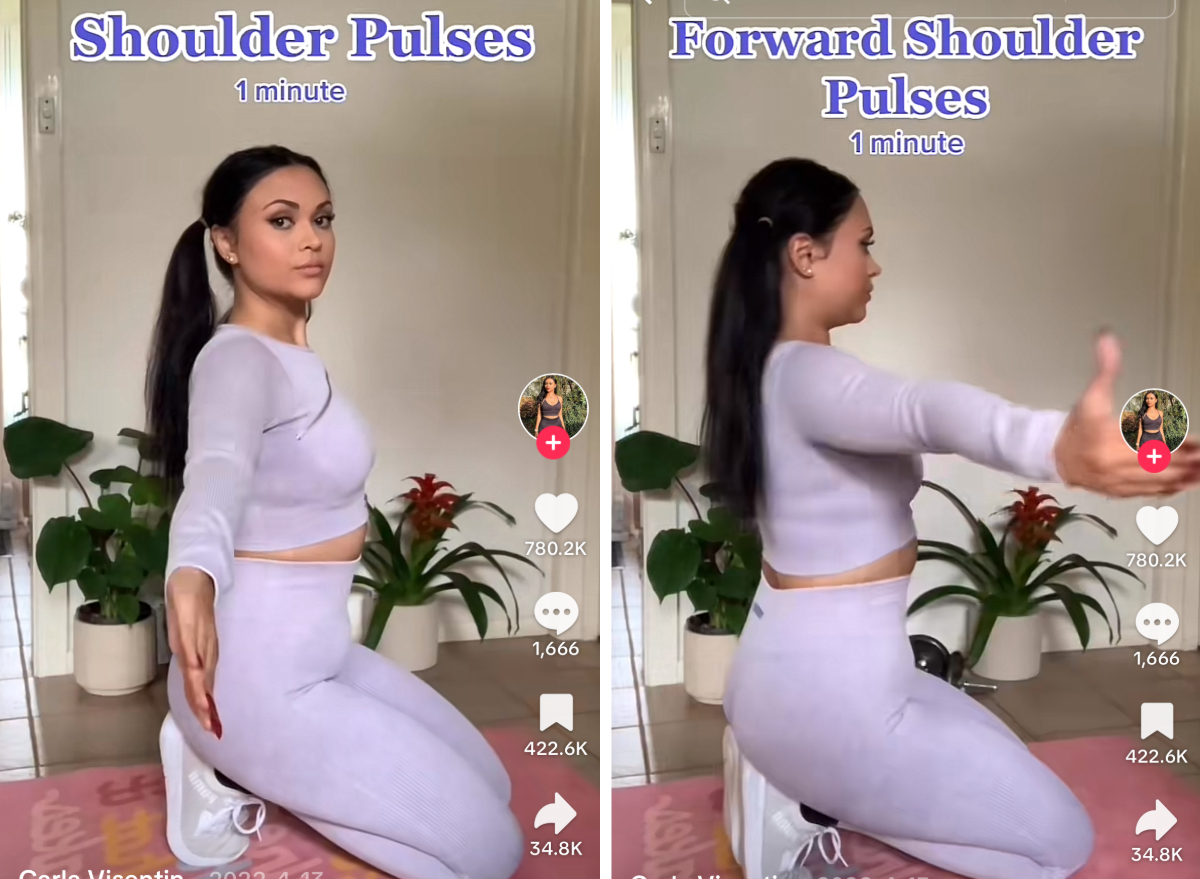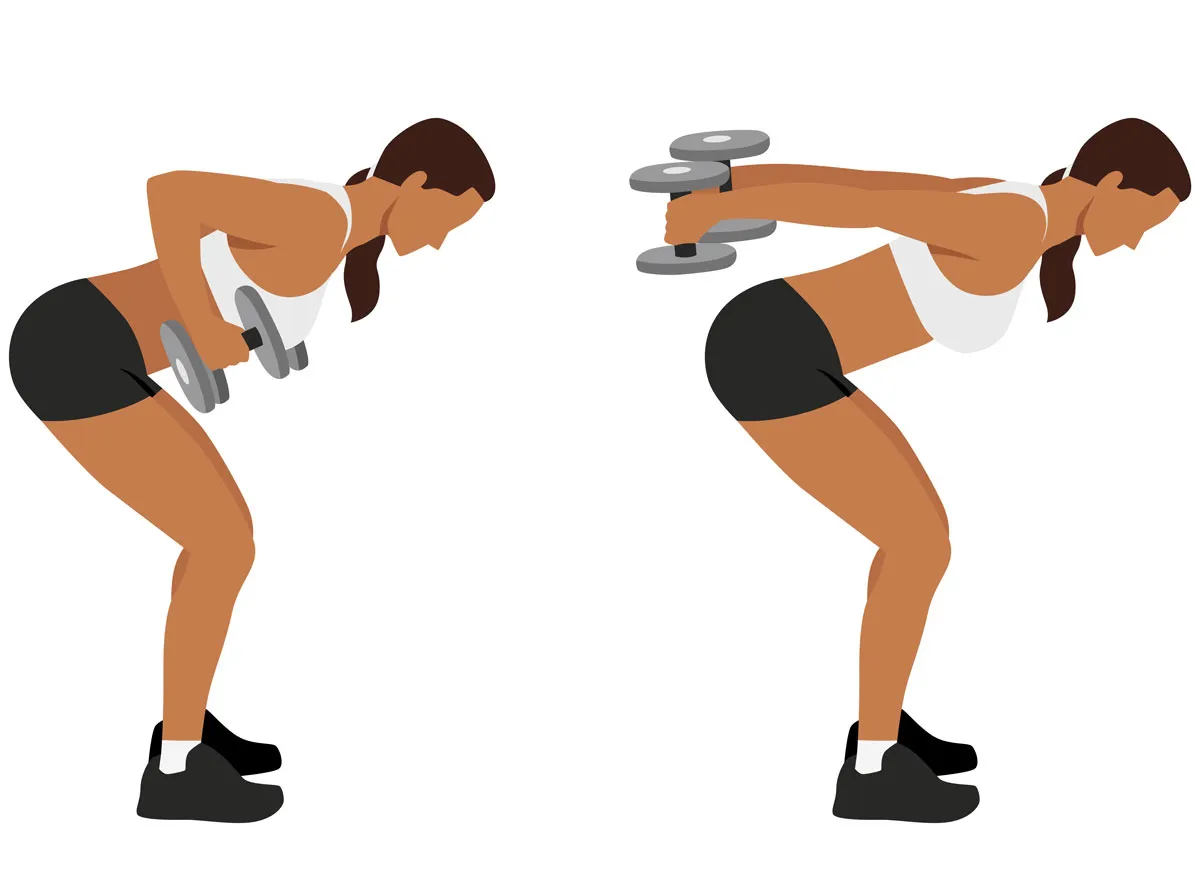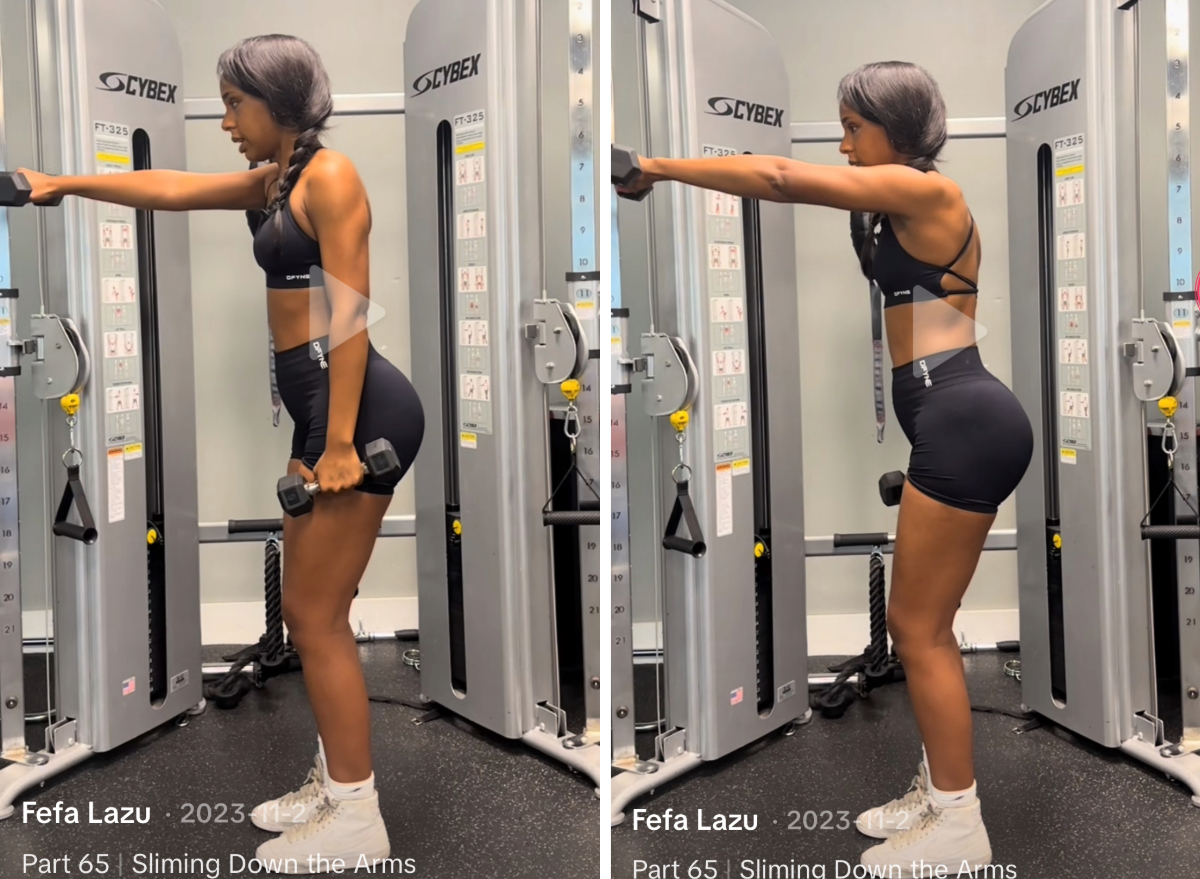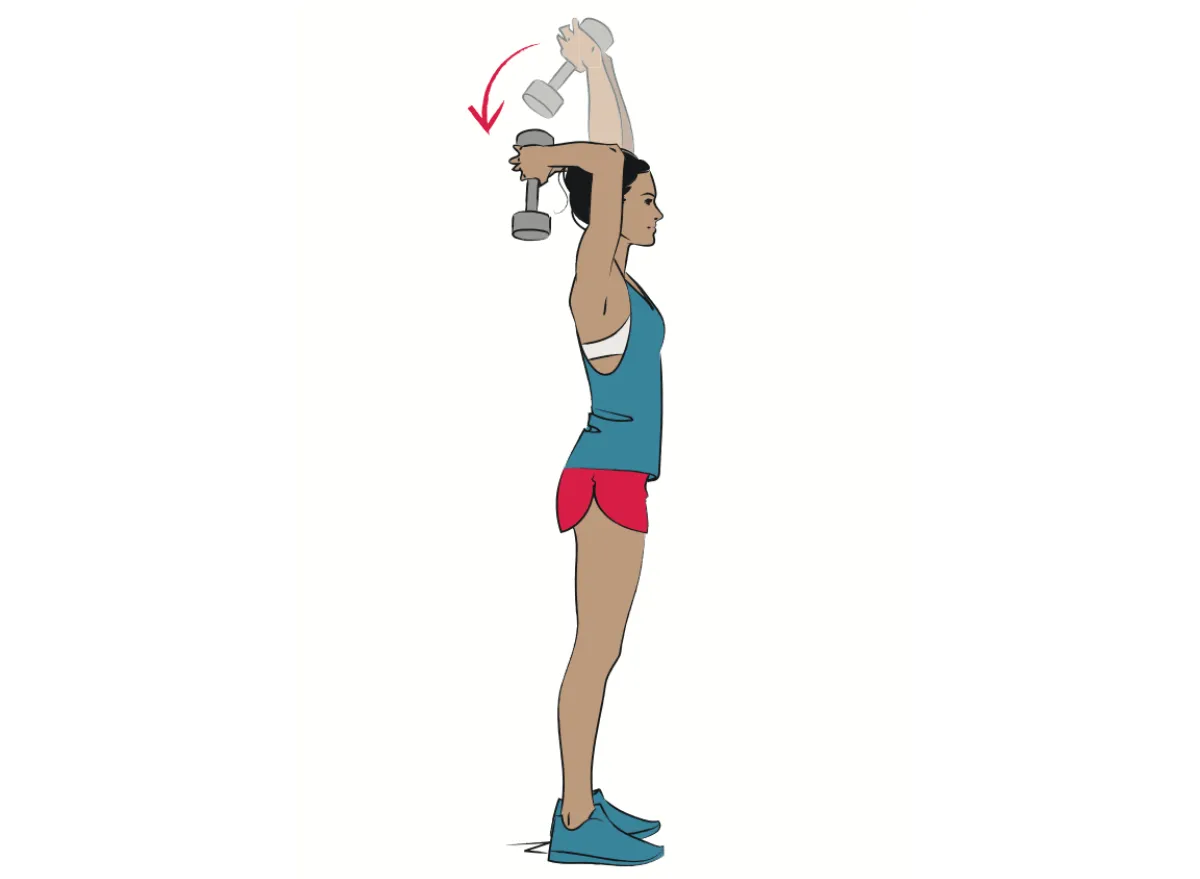Fitness
People Swear By These 7 Exercises for Slimmer, More Toned Arms

If you want to sculpt sleek, slim, and toned arms, consider your search a success. You can always count on social media—namely, TikTok—to deliver some of the latest and greatest workouts, fitness trends, and challenges. Whether you’re in the market to spruce up your “arm day” workout or are just kickstarting your fitness journey, TikTok is here to deliver tried-and-true exercises that are backed by people who have experienced results. People swear by the below exercises for slimmer arms, so keep reading to learn more. And when you’re finished, be sure to check out People Are ‘Retro Walking’ & Swear by the Benefits: ‘My Posture Is Now Nearly Perfect’.
1. Arm Holds
TikToker @eunicness shared in a video, “Do this to get slim arms in one week.” She encourages viewers to follow her exercise regimen of five “easy” exercises to melt arm fat.
Her first exercise is called “pulsing arms,” which consists of standing tall and lengthening her arms out to the sides at shoulder height. In the clip, she then pulses her arms up and down for eight counts and holds for another eight counts. Next, the TikToker performs wrist rotations for eight counts in each direction and ends them with an eight-count hold. She then goes into eight counts of elbow rotations in each direction, along with another eight-count hold. Small arm circles are next with an eight-count hold before moving into big arm circles and a final hold for 30 seconds or more.
2. Arm Pulses

TikTok user Carla Visentin (@carlavisentin_) shared a video on the platform about the “arm exercises I used to slim my arms.” A few of them include pulses. In the clip, she does one minute of shoulder pulses, one minute of forward shoulder pulses, and another minute of prayer pulses.
3. Tricep Kickbacks


Another exercise Visentin includes in her arm routine is the tricep kickback. You can perform this exercise with dumbbells or water bottles as a substitute. Hold a dumbbell or water bottle in each hand, hinge forward, press your hips back, and extend both arms back. Squeeze your triceps before bringing the weights to your chest.
4. Bicep Curls
TikTok user Fefa Lazu explains in her workout video, “I’m going to tell you the workouts I did to get rid of [arm fat] but with a little education behind it.” Lazu stresses that because she wanted slimmer arms, she made sure to use light weights and perform high reps. She says this while performing standing bicep curls, lowering and raising the dumbbells toward her chest.
5. Front Raises


Another exercise recommendation from Lazu? “[Front] raises are important because it’s going to help you in the long run when it comes to your lower-body workouts,” she explains. “Make sure that you’re putting it all the way forward and then stopping.”
6. Hammer Curls
TikToker hannah! (@hannahskyesburch) captioned her video, “‘I want slim toned arms but idk what to do’ … I GOT YOU! Save this for your next workout.” In her clip, she performs four sets of 10 hammer curls. To perform the hammer curl, hold a dumbbell in each hand with your palms facing each other. Curl the dumbbells up to your chest, squeezing at the top of the curl before you slowly lower the weights.
7. Tricep Extensions


Another exercise from TikTok user hannah! is the tricep extension. You can perform this exercise sitting or standing. If standing, assume a tall stance, and hold a dumbbell with both hands overhead, arms extended. Lower the dumbbell to the back of your head, making sure your elbows stay close to your ears. Then, raise the weight back overhead.
Alexa Mellardo

Fitness
Fitness trainer with 18 years of experience shares why exercise is crucial for kids: ‘Not just about health and fitness’

Exercise is often spoken about in the context of physical fitness – stronger muscles, better stamina and improved overall health. But its value, especially for children, extends far beyond the body. Regular physical activity can quietly shape character, teaching lessons about effort, patience, discipline and resilience that mirror how the real world works. From learning to cope with discomfort to understanding that progress takes time, exercise can become a powerful training ground for life itself.
Also Read | Chennai fitness trainer with 18 years of experience shares 5 simple things to focus on for long-term fitness
Chennai-based fitness trainer with 18 years of experience, Raj Ganpath – founder of the Slow Burn Method, co-founder and head coach at Quad Fitness, and author of Simple, Not Easy – is shedding light on why exercise is important for kids, with the benefits going beyond health and fitness. In an Instagram video shared on February 27, he explains how the impact of exercise extends far beyond physical wellness, shaping resilience, discipline and long-term character development.
Embracing discomfort
According to Raj, exercise is one of the healthiest ways to help children learn how to sit with discomfort in a safe, structured and sustainable way. Life inevitably brings challenges and unease – something adults understand well – but many children today are shielded from situations that test their resilience.
He explains, “Exercise is a great way to experience this discomfort in a safe and sustainable manner. Lifting weights, holding a plank, doing cardio, repping till it burns, all of these things are opportunities to embrace discomfort, opportunities to put themselves in a place where they’re not comfortable and learn from it, opportunities to practice physical and mental resilience.”
Learning hardship
The fitness trainer emphasises that hardship is an inevitable part of life, and meaningful success often requires pushing through moments of difficulty. While most adults recognise this truth through lived experience, children may not always have the same exposure to challenge. Raj believes exercise can bridge that gap.
He elaborates, “It will teach them that they need to do hard things if they want to accomplish something. Getting through a very hard workout, setting a goal and achieving it, completing a task. All of these things are not just random chores. These are incredible opportunities – opportunities to experience hardship and build fortitude.”
Delayed gratification
In today’s fast-paced world, the desire for instant gratification is stronger than ever – and children are growing up at the centre of it. With technology, streaming platforms and 10-minute delivery services, almost everything is available at the tap of a screen. As a result, the ability to wait, persist and work steadily towards a long-term goal can easily take a back seat. Exercise, notes Raj, offers a powerful counterbalance.
He explains, “Everyone wants everything right away today. This is true for us adults too, but it is even more true for our kids because this is the only world they know. A world where everything happens right then and right there, whenever they want it, wherever they want it. Exercise will teach them to wait, to be patient, to trust the process, to fail and still keep going, to work towards something larger that they will get much later. This is a very important character building quality and will serve them well for many, many years to come.”
The fitness trainer concludes, “Exercise is not just about health and fitness. It is a simulation of life itself. A ready-made character building tool available to you to help prepare your kids for life, the raw and real life that they’re going to have to deal with no matter what. So make sure they build the habit and make sure they embrace it.”
Note to readers: This article is for informational purposes only and not a substitute for professional medical advice. It is based on user-generated content from social media. HT.com has not independently verified the claims and does not endorse them.
Fitness
What Are “Movement Snacks”? How To Try This Trending Fitness Hack

The World Health Organization says the average adult is supposed to get 60 minutes of moderate to vigorous activity five days a week, which sounds somewhat doable until it’s 9 p.m., your kids are finally in bed, and you just want to fall onto the couch and dissociate. But more and more people online are talking about “movement snacks” — little bite-sized amounts of exercise you can do throughout your day to meet your 60-minute goal without having to make special time for one big workout. Because yes, we all want to be our healthiest, but sometimes a HIIT class at the gym is just not in the schedule.
We asked personal trainers and fitness coaches for their favorite movement snacks you can do in the office, around the house, and on busy weekends when everyone’s home.
How much exercise is a person really supposed to get?
While the WHO recommends 60 minutes a day, the CDC is a little more lax, recommending at least 150 minutes of moderate-intensity physical activity a week, or about 30 minutes a day, five days a week. While it may feel like you’re the only one struggling to fit a workout into your daily routine, you’re far from alone. In fact, it’s always been hard for most Americans. So, while movement snacks may be a cute new term we’re all hearing for the first time, fitness pros have been promoting bite-sized exercise forever.
“I work with busy professionals, so I’ve been integrating micro workouts of two to 10 minutes into my clients’ lifestyles for almost 20 years,” says Andrea Marcellus, certified personal trainer and CEO of AND/life.
The most important thing for your health isn’t getting all your daily movement done in one big, perfectly curated workout — it’s about being consistent, Marcellus says. Movement snacks can help you stay consistent because you don’t have to budget a big chunk of time; instead, you can fit something simple into your day when you have three minutes to spare. Hell, you don’t even have to change clothes or go anywhere.
“Most people think movement only counts if it’s a workout. That mindset is what keeps people sedentary. In reality, your body doesn’t care if steps come from a hike, a gym session, or pacing when you’re on a call,” says Lindy Royer, physical therapist and balanced body educator. “This is where you win the game — by stacking movement into things you’re already doing.”
Movement Snacks To Try Throughout Your Day
- Set an alarm on your phone to chime every hour — that’s what women’s fitness coach Allison Kalsched tells her clients. When it goes off, stand up and do 10 bodyweight squats. Then go back to work. When you get tired of squats, mix in walking lunges, push-ups (it’s fine if they’re modified!), or dead bugs. Throw on 30 seconds of jumping jacks or high knees for bone-building benefits, which is important for women in menopause, she adds.
- Take a micro walk. “Five minutes or 500 steps is my absolute favorite,” says Dr. Milica McDowell, doctor of physical therapy, author of the forthcoming book Walk, and exercise physiologist at US Physical Therapy. “It changes mood, lowers blood pressure, boosts mental clarity, and can help you get your cumulative steps in.”
- Dance to your new favorite song with your kids or all by yourself. “Dance party was big with my kids after dinner,” Marcellus says. “It takes four to 10 mins and helps kids burn off dinner energy, while also giving parents a metabolic boost.”
- Stop and do 60 reps of any full-body exercise, like squats, lunges, or jumping jacks — this usually takes about two minutes, no matter which one you choose, Marcellus says. Or, hold a plank for one to two minutes.
- Pair walking with habits that already exist to get your steps in, like marching in place while brushing your teeth or doing a lap inside the house while your food is in the microwave. “This means you’re not adding time — you are upgrading your time,” says Royer.
- Count your housework. Sweeping, mopping, vacuuming, general domestic labor — these things totally contribute to your total exercise time each day, says Royer.
- If you go up or down the stairs at home, just… do it two or three times. That little extra here and there adds up, according to Royer.
The best advice is to focus not on “how can I move right now?” but “how can I do something that isn’t sitting right now?” Royer says. “The real truth that most people ignore is that sedentary time is the real enemy, not a lack of workouts. Focus on breaking up your sitting time. Build in frequent movement snacks. You’re not looking for perfection, just something more than nothing. You don’t need more time; you actually just need more conscious efforts to move.”
Fitness
At 66, Judy Murray swapped skipping for rebounding – here’s why it’s so effective for midlife women

A household name synonymous with tennis, Judy Murray has branched out in recent years when it comes to fitness. While the coach and former player still frequents the court – it’s integral to her day job, after all – she has incorporated several other activities into her routine, including one you might be unfamiliar with: rebounding.
Rebounding
In an interview with The Times, Judy explained that while skipping had been part of her tennis routine for years, she’d decided to replace it with rebounding – jumping on a trampoline – due to the impact skipping started to have on her joints and legs. And she’s onto something – a NASA study found rebounding to be up to 68% more effective at working the muscles and joints than treadmill running – something scientists call mechanical loading, which is crucial for bone, muscle and tendon health.
It doesn’t have to be expensive, either. Judy told The Times that she had bought a mini trampoline for £24.99 and that she used it in one-minute bursts.
‘Rebounding can be a smart swap for women in midlife, particularly if high-impact skipping or plyometric training has started to feel unforgiving on the joints,’ says personal trainer Michael Baah. ‘As oestrogen declines during perimenopause and menopause, we typically see reductions in bone mineral density, muscle mass and tendon elasticity,’ he explains. ‘High-impact ground reaction forces from traditional skipping can be effective for bone health, but they also place substantial load through the knees, hips and Achilles.’ Rebounding, on the other hand, ‘absorbs some of the ground reaction force, reducing peak stress through the joints, while still stimulating muscle activation in the calves, glutes and core.’
It shouldn’t replace strength training, adds Baah, which ‘remains the most effective intervention for combatting age-related sarcopenia and maintaining metabolic health,’ but it’s an incredibly valuable conditioning tool ‘for women who want to protect their joints while maintaining cardiovascular fitness.’
Below, we also look at the other workouts Judy has turned to in recent years to stay strong and active while protecting her joints – and why you should try them, too.
She swims
‘As I get older I have found a lot of things I enjoyed doing really impact my knees and hips, but a lot of things I can do in water…I also realise I have five grandchildren now. I want to be able to run after them and pick them up and put them down with relative ease,’ Judy told The Times. ‘I have a whole routine I do in the swimming pool and there is no impact in the water. It is a better way to do some of the things I used to do.’
Indeed, not only does swimming protect your joints, but it’s also effective for cardio fitness. ‘The biggest advantage of swimming is that it is low impact. The buoyancy of water significantly reduces joint loading, making it an excellent option for people with joint pain or who have a lower tolerance to impact,’ personal trainer and nutritionist Georgia Garlick previously told WH. ‘It is a true full-body exercise, involving the upper body, trunk, hips and legs simultaneously.’ On average, she added that moderate swimming burns 500-700 kcal per hour – typically more than moderate cycling.
She has started playing golf
Judy has also discussed how participating in Strictly Come Dancing back in 2014 instilled in her a desire to continue challenging herself and trying new things – no matter her age. In that vein, ahead of her 65th birthday, she told HELLO!, that she had taken up golf. ‘I’m addicted to it, it is so incredibly relaxing,’ she said. ‘It gets me out in the fresh air and away from my phone and because it’s not as physically demanding as running around a tennis court, it suits me now that my arms aren’t as strong as they once were.
‘As we get older it’s so important to keep trying to find things that stimulate you, make you think and keep you socially connected – and golf ticks all of those boxes.’
A review published in the British Journal of Sports Medicine linked golf to an increased life expectancy, reduced risk of chronic disease and improved mental health.
She plays pickleball
While padel has become hugely popular, it seems that its sibling pickleball – which combines tennis, badminton and table tennis – is more up Judy’s street. After trying the sport herself, she’s since campaigned to get more people involved. ‘It’s just fun and engaging, and it’s incredibly inclusive. And for Scotland, it’s a perfect fit for us. We have terrible weather, we have badminton courts everywhere – in every community centre and sports centre. Even church halls have badminton courts,’ she told The National. ‘In terms of setting up quickly, wherever you are, I think it’s a perfect fit for getting more people more active.’
Judy added that she sees it as a perfect transition from tennis to something that will let her play a similar game for longer.
She stretches regularly
The final touch to Judy’s fitness routine? A dedicated stretching routine. ‘Since I turned 60, I’ve realised how important it is to stretch to stay mobile and flexible if I want to stay active with my grandchildren,’ she told HELLO!.
While we don’t know the specifics of Judy’s stretching routine, even dedicating just a few minutes daily to mobility can supercharge longevity.
There is an ideal routine based on science, though. According to a panel of experts convened by the American College of Sports Medicine, who reviewed a range of studies, you should:
- Do flexibility exercises (stretches, yoga or tai chi) for all major muscle-tendon groups – neck, shoulders, chest, trunk, lower back, hips, legs and ankles – minimum two to three times per week.
- Spend 60 seconds on each exercise. If you can hold a specific stretch for 15 seconds, try repeating it three more times and if you can hold it for 20 seconds, two more repetitions would be ideal.
As Judy regularly says, though, it’s about finding forms of exercise that you enjoy, as you’ll be far more likely to find the time – even if it’s for five minutes – to get stuck in.
Hannah Bradfield is a Senior Health and Fitness Writer for Women’s Health UK. An NCTJ-accredited journalist, Hannah graduated from Loughborough University with a BA in English and Sport Science and an MA in Media and Cultural Analysis. She has been covering sports, health and fitness for the last five years and has created content for outlets including BBC Sport, BBC Sounds, Runner’s World and Stylist. She especially enjoys interviewing those working within the community to improve access to sport, exercise and wellness. Hannah is a 2024 John Schofield Trust Fellow and was also named a 2022 Rising Star in Journalism by The Printing Charity. A keen runner, Hannah was firmly a sprinter growing up (also dabbling in long jump) but has since transitioned to longer-distance running. While 10K is her favoured race distance, she loves running or volunteering at parkrun every Saturday, followed, of course, by pastries. She’s always looking for fun new runs and races to do and brunch spots to try.
-

 World2 days ago
World2 days agoExclusive: DeepSeek withholds latest AI model from US chipmakers including Nvidia, sources say
-

 Massachusetts2 days ago
Massachusetts2 days agoMother and daughter injured in Taunton house explosion
-

 Montana1 week ago
Montana1 week ago2026 MHSA Montana Wrestling State Championship Brackets And Results – FloWrestling
-

 Oklahoma1 week ago
Oklahoma1 week agoWildfires rage in Oklahoma as thousands urged to evacuate a small city
-

 Louisiana5 days ago
Louisiana5 days agoWildfire near Gum Swamp Road in Livingston Parish now under control; more than 200 acres burned
-

 Denver, CO2 days ago
Denver, CO2 days ago10 acres charred, 5 injured in Thornton grass fire, evacuation orders lifted
-

 Technology6 days ago
Technology6 days agoYouTube TV billing scam emails are hitting inboxes
-

 Technology6 days ago
Technology6 days agoStellantis is in a crisis of its own making

























